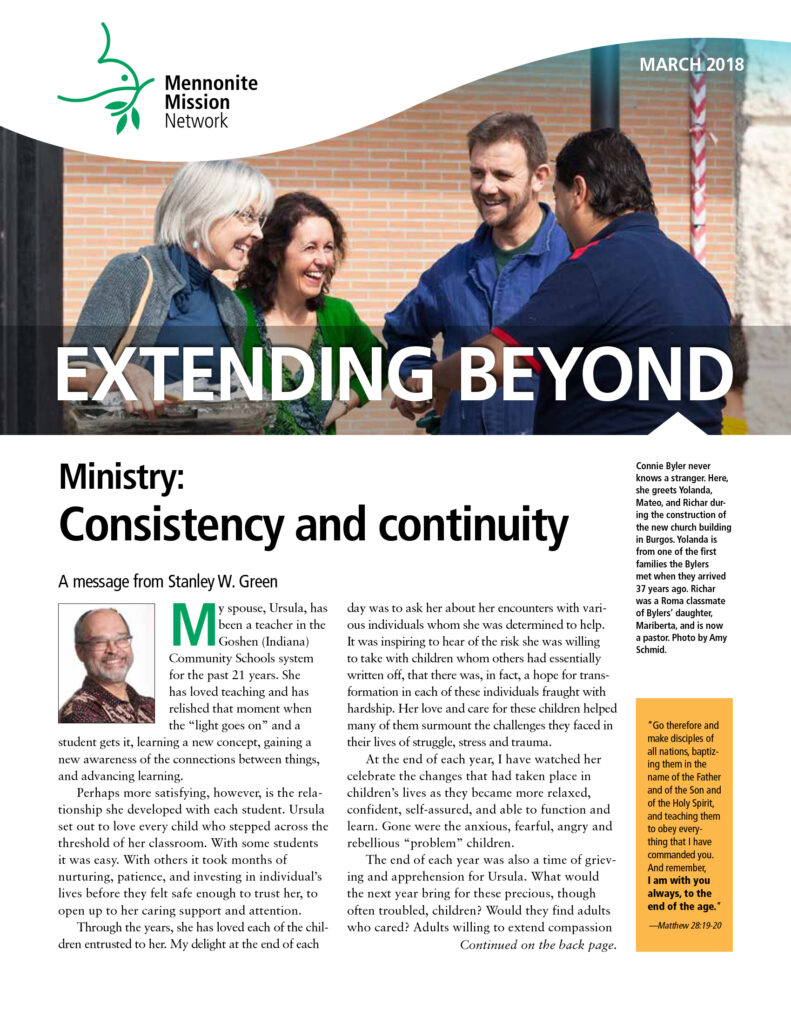"Go therefore and make disciples of all nations, baptizing them in the name of the Father and of the Son and of the Holy Spirit, and teaching them to obey everything that I have commanded you. And remember, I am with you always, to the end of the age."
—Matthew 28:19-20
My spouse, Ursula, has been a teacher in the Goshen (Indiana) Community Schools system for the past 21 years. She has loved teaching and has relished that moment when the "light goes on" and a student gets it, learning a new concept, gaining a new awareness of the connections between things, and advancing learning.
Perhaps more satisfying, however, is the relationship she developed with each student. Ursula set out to love every child who stepped across the threshold of her classroom. With some students it was easy. With others it took months of nurturing, patience, and investing in individual’s lives before they felt safe enough to trust her, to open up to her caring support and attention.
Through the years, she has loved each of the children entrusted to her. My delight at the end of each day was to ask her about her encounters with various individuals whom she was determined to help. It was inspiring to hear of the risk she was willing to take with children whom others had essentially written off, that there was, in fact, a hope for transformation in each of these individuals fraught with hardship. Her love and care for these children helped many of them surmount the challenges they faced in their lives of struggle, stress and trauma.
At the end of each year, I have watched her celebrate the changes that had taken place in children’s lives as they became more relaxed, confident, self-assured, and able to function and learn. Gone were the anxious, fearful, angry and rebellious "problem" children.
The end of each year was also a time of grieving and apprehension for Ursula. What would the next year bring for these precious, though often troubled, children? Would they find adults who cared? Adults willing to extend compassion and understanding and patience? Troubled by a possible setback for these children, I often heard Ursula’s lament that she couldn’t continue with her students through subsequent grades to provide the consistency of care and understanding.
Unfortunately, the U.S. education system often places little emphasis on consistency in teacher-student relationship. In Japan, where cognitive learning is stressed, elementary teachers stay with their classes for two years or more. Japanese teachers say that the first year is for getting to know the students, and the second is for teaching. Japanese educators clearly believe that it is more important for teachers to know students well than to be specialists in one grade level or content area.
Almost every study, and virtually every casual observation, shows that stability, longevity and intimacy are essential to healthy relationships. The Japanese education system seems to understand that healthy group cohesion and close adult-student relationships need time to develop. In their system continuity is a crucial factor.
At Mennonite Mission Network, we share this compelling conviction. This shared belief has led us to embrace two crucial commitments in our mission engagements around the world: developing strong relationships are essential and indispensable; and continuity and consistency are imperative to developing trust and a willingness to risk in such relationships. We attempt to adhere to these commitments in every place where we work. Our commitment issues from the conviction that, just as in any marriage, investing time in building relationships is key to the happiness and thriving of the partners. So, too, in any partnership, but especially so in cross-cultural engagements, such an investment is imperative and indispensable.
Our engagement with God’s mission in Spain is one example of this way of working. Connie and Dennis Byler have invested their lives (37 years) in serving alongside Spanish sisters and brothers to bring healing and hope in a country that has experienced many challenges and struggles.
Whether ministering with drug addicts or people suffering with AIDS, planting churches, developing leaders for the church through formal and informal ways, leading worship, or simply through providing hospitality and companionship, Dennis and Connie have provided a consistent Christian witness in that country for several decades. As a result of the consistency and continuity their presence has provided, others have come and gone (including our son, Lee, who served in their village of Quintanaduenas on the edge of Burgos). They have found their place and connected into the network of relationships and trust that were built over a lifetime of investment. Their reputation opened the door for others (the Foxes, the Machados, and the Garbers—about whom you can read in other parts of this piece) to find their place in God’s mission in Spain.
With Bylers’ retirement we are thrilled that the ministry can continue, and relationships strengthened through these new servants whom God has called. Our sisters and brothers in the Spanish church know that, though roles may shift and change with changing times, relationships will continue in the space of trust and consistency that has been painstakingly built over decades of mutual investment. For this we are grateful, because we are reassured that in this space a fertile imaginative field is created where trust is experienced, and the opportunity to creatively explore a vision for new initiatives in mission together is made possible. Thanks also to you who have so generously contributed to making it possible for us to invest in developing enduring relationships marked by consistency and continuity—the defining characteristics of the God we serve, and, as we believe, the essential characteristics of effective mission.
Stanley W. Green
Executive Director

